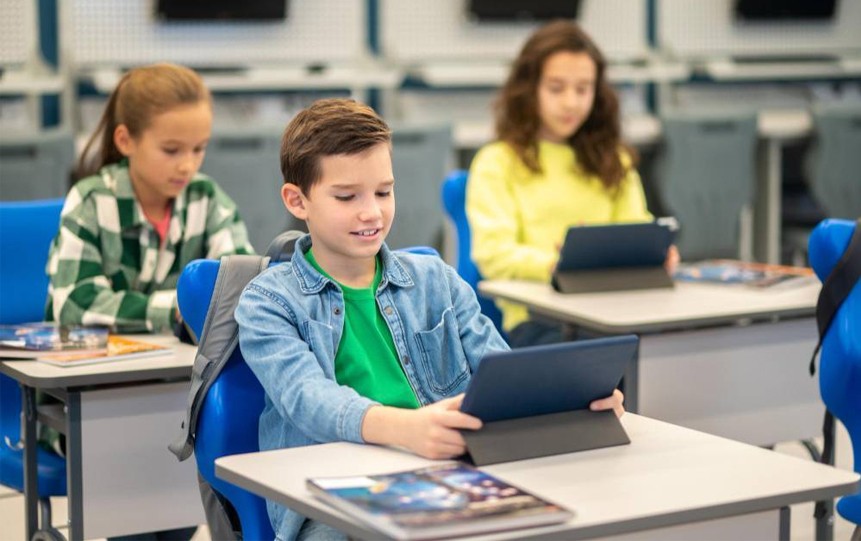Just imagine a classroom in which every student thrives, is challenged at their optimal levels, and supports them in all areas that may need reinforcement. Such is the power of MRCC EdTech’s personalized learning, a revolutionary approach that tailors education to individual needs and learning styles.
Traditional, one-size-fits-all teaching methods increasingly leave students frustrated and bored. However, the integration of artificial intelligence (AI) into personalized learning is reshaping the landscape of education by fundamentally altering both student learning experiences and teaching methodologies. Through the collection and analysis of student performance data, these AI algorithms discern learning patterns, then customize instructional resources to cater to the student’s individual needs.
This personalized learning paradigm has notably enhanced student engagement and academic achievements. As per the above study, the global AI in the education market was valued at $0.8 billion in 2019, and is anticipated to surge to $3.7 billion by 2025, propelled by the escalating need for effective and pioneering learning solutions.
This shift in education towards personalization isn’t just about academic success; it’s about nurturing an intrinsic love of learning. Thus, by catering to individual strengths and weaknesses, personalized learning empowers students to take ownership of their education, fostering engagement and motivation.
How Personalized Learning Works
Personalized learning begins with understanding the learner, a multifaceted approach that utilizes technology and data to create a dynamic learning experience for each and every student. Let’s delve deeper into the inner workings of personalized learning:
1. Data Collection: The learning foundation begins in gathering comprehensive data about each student, which paints a personalized picture of their strengths, weaknesses, learning styles, interests, and prior knowledge. Here are some ways the data is collected:
- Pre-Assessments: Diagnostic assessments at the beginning of a course or course unit identify both existing knowledge and potential learning gaps.
- Formative Assessments: Ongoing quizzes, projects, and class participation provide real-time feedback on student progress.
- Student Self-Evaluations: Students reflect on their learning experiences and identify areas in which they feel confident or need further support.
- Learning Management Systems (LMS) Data: Data from interactions within online learning platforms reveal learning styles and areas requiring more attention.
2. Data Analysis & Profiling: The collected data is analysed by advanced algorithms, often powered by machine learning, creating a personalized learning profile for each student that captures their unique learning style (visual, auditory, kinaesthetic, social), preferred pace, and areas of mastery or which require reinforcement.
3. Curating Learning Paths: Based on the individual student profile, a personalized learning path is designed. This path may include:
- Differentiated Instruction: Teachers may adjust their teaching methods according to student needs. For example, some students may benefit from more visual aids, while others might excel with hands-on activities.
- Personalized Activities & Resources: Students are assigned learning activities and resources tailored to their interests, learning styles, and skill levels. This could involve interactive games, simulations, multimedia resources, or projects aligned with their preferred learning styles.
- Adaptive Learning Tools: These intelligent platforms adjust the difficulty level and content based on student performance. For example, if a student struggles with a concept, the platform might offer additional practice problems or provide targeted interventions.
4. Feedback & Progress Monitoring: Personalized learning is an ongoing cycle in which consistent feedback from teachers, peers, and self-assessment tools help students track their progress and identify areas for improvement. This feedback loop allows for adjustments to the learning plan as needed, ensuring continuous progress.
Thus, personalized learning provides a flexible framework that educators and technology can leverage to create a dynamic learning environment that caters to the unique needs and potential of each student.
The Potential of Personalized Learning
Personalized learning holds immense potential to revolutionize education by transforming the learning experience for students to boost educational outcomes. Please go through the below post to explore the potential of personalized learning in detail.
1. Enhanced Engagement & Motivation:
- Catering to Interests: Personalized learning caters to individual interests, making learning more engaging and enjoyable. Students are more likely to be motivated when they’re exploring topics and activities that pique their curiosity.
- Addressing Challenges: By identifying and addressing individual learning gaps, personalized learning prevents students from feeling overwhelmed or bored by fostering a sense of accomplishment that keeps them motivated to learn.
- A Sense of Ownership: Personalized learning empowers students to take ownership of their learning journey, in which they have a say in their learning goals, activities, and pace, leading to a greater sense of responsibility and motivation.
2. Improved Academic Outcomes:
- Focused Learning: Personalized learning ensures students focus on areas needing improvement, and that they master concepts before moving on. This targeted approach leads to a deeper understanding of content and improved academic performance.
- Closing the Achievement Gap: Personalized learning caters to students with diverse learning styles and abilities. This targeted support helps bridge the achievement gap and ensures all students have the opportunity to succeed.
- Developing Critical Thinking Skills: Personalized learning encourages students to become active participants in a learning journey in which they analyse information, solve problems, and make connections, fostering critical thinking skills essential for academic success and lifelong learning.
3. Personalized Development & Lifelong Learning:
- Identifying Strengths & Weaknesses: Personalized learning helps identify individual strengths and weaknesses, allowing students to develop their unique talents while receiving targeted support to overcome challenges.
- Building Confidence: By mastering concepts and experiencing success, personalized learning fosters confidence in students’ abilities, empowering them to tackle future academic challenges and become lifelong learners.
- Adapting to Individual Needs: The world of work and personal development is constantly evolving. Personalized learning equips students with the skills to adapt to changing environments and become lifelong learners who can continuously acquire new knowledge and skills.
4. Empowering Educators:
- Data-Driven Instruction: Personalized learning provides educators with valuable data on student progress that allows for more informed instruction and targeted interventions, maximizing the impact of teaching.
- Focus on Individual Needs: Personalized learning shifts the focus from a one-size-fits-all approach to individual student needs. This allows educators to spend more quality time supporting students who need it most.
- Enhanced Job Satisfaction: By witnessing their students thrive via the impact of their personalized approach, educators can experience greater job satisfaction and a sense of accomplishment.
Personalized learning has the potential to be a powerful tool for promoting equity and inclusion in education. By catering to individual learning styles and needs, personalized learning ensures that all students have an equal opportunity to succeed, regardless of background or ability.
Best Practices for Personalized Learning Solutions
When implementing personalized learning solutions, it’s crucial to adhere to best practices. By integrating these practices into your learning and development initiatives, you can craft an engaging and impactful learning experience for individuals. Here are some key areas to focus on:
1. Creating Engaging and Relevant Content:
- Variety is Key: Offer a diverse range of content formats such as interactive games, simulations, multimedia resources, and real-world applications. These cater to diverse learning styles and keep students engaged.
- Focus on Quality: Ensure the content is best-quality, accurate, and that it aligns with learning objectives. Engaging visuals, clear explanations, and interactive elements significantly enhance the learning experience.
- Relevance Matters: Connect learning to students’ interests and real-world scenarios in order to foster a deeper understanding to make learning more meaningful.
2. Incorporating Different Learning Styles:
- Cater to All Styles: Accommodate visual, auditory, kinesthetic, and social learning styles. Visual learners benefit from infographics and videos, while auditory learners excel with podcasts and audiobooks. Kinesthetic learners thrive with hands-on activities, and social learners benefit from group projects and discussions.
- Learning Style Assessments: Employ learning style assessments to identify student preferences, then tailor the learning experience accordingly.
- Flexibility is Key: Provide students with choices in how they learn, allowing them to access information and demonstrate their understanding in ways that suit their preferred learning styles.
3. Ongoing Evaluation and Feedback:
- Regular Assessments: Utilize formative assessments like quizzes, projects, and self-reflections to monitor student progress. This allows for timely identification of learning gaps and adjustments to the learning plan.
- Meaningful Feedback: Provide constructive and specific feedback to help students understand their strengths and areas for improvement. Make feedback actionable by offering suggestions for improvement and additional resources.
- Student Self-Assessment: Encourage students to reflect on their learning journeys and identify areas where they feel confident or need further support. This empowers them to take ownership of their learning.
4. Leverage Technology:
- Seamless Integration: Ensure the personalized learning solution integrates seamlessly with existing learning management systems (LMS) and other educational technology tools used in the classroom.
- Data Security & Privacy: Prioritize data security and student privacy by adhering to relevant regulations and using secure data storage practices.
- Ongoing Support: Provide ongoing technical support for educators and students to ensure they can effectively utilize the personalized learning solution.
5. Collaboration & Professional Development:
- Teacher Collaboration: Encourage collaboration among educators to share best practices, troubleshoot challenges, and build a strong support network for effectively implementing personalized learning.
- Professional Development: Invest in professional development programs to equip educators with the skills and knowledge necessary to use personalized learning solutions effectively. This could include training on data analysis, differentiation strategies, and integrating technology into the classroom.
- Building a Support System: Create a support system within the school or institution that fosters personalized learning implementation. This could involve administrators, instructional coaches, and technology specialists working together to address challenges and ensure success.
Why Choose MRCC EdTech for Personalized Learning Solutions?
Personalized learning is not a magic trick, but a powerful systematic approach that transforms education. To incorporate this shift, first you need to analyse your curriculum by identifying the areas lacking individual engagement and personalization, then select specific content solutions.
That’s where MRCC EdTech comes in.
We understand that every student learns differently. That’s why we offer a comprehensive suite of personalized learning solutions designed to empower educators and unleash the full potential of every learner.
Our services go beyond simply providing content. Rather, MRCC EdTech offers a holistic, innovative, and personalized approach that equips you with the tools and expertise needed to create a truly transformative learning environment. Here’s what sets MRCC EdTech apart:
- Expertly Crafted Content: Our team of learning specialists develops high-quality, innovative, and interactive content that caters to diverse learning styles and interests. We leverage cutting-edge technology to create adaptive learning platforms that personalize the learning journey for each and every student.
- Data-Driven Insights: Our learning platforms are powered by robust data analytics, providing educators with real-time insights into student progress. This data allows for targeted interventions, personalized instruction, and a vivid picture of student achievement.
- Expert Support: We believe successful implementation is key. That’s why we offer expert support to equip educators with the skills and knowledge needed to effectively utilize personalized learning solutions in their classrooms. We also provide ongoing support to ensure seamless integration and maximize learning outcomes.
By partnering with MRCC EdTech, you’re not just choosing a personalized learning solution – you’re choosing a dedicated partner in your learning journey to empower student success. We’ll work alongside you every step of the way to create a dynamic learning environment that fosters engagement, ignites curiosity, and unlocks the potential of every one of your learners.
Please contact MRCC EdTech today and let’s transform learning together!





Leave A Reply
Your email address will not be published. Required fields are marked *